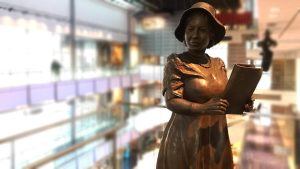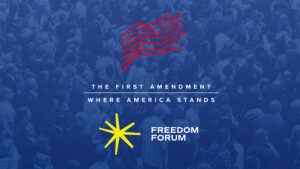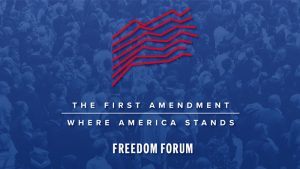Why You Should Care About the First Amendment
The First Amendment gives each of us freedom:
- To set our own values.
- To express ourselves openly on whatever topic we want without fear of government control or punishment.
- To join with others to make our views known and perhaps create positive change on behalf of all of us.
These freedoms can help define who we are as individuals in a complex, changing, self-governing society.
Religion
This freedom protects all – even the growing number of religiously unaffiliated, or “nones” – as we each decide what values, principles and beliefs shape our lives, by forbidding the government from telling us what to think or believe.
Sometimes called the right of conscience, it protects all from action by government to control our thoughtful independence and prohibits the government from supporting any one faith or personal belief over others.
Speech
This freedom protects the expression of our individual values, ideas and opinions and prevents the government from stifling the spoken word and from controlling any of the ways we reach out to others. The government cannot control or punish any of us for what we choose to say, with very few exceptions that include defamation, true threats, obscenity, fraud and incitement to violent acts that endanger others. The government cannot silence any of us for the way we choose to speak – subject to reasonable “time, place and manner” rules so we don’t unfairly intrude on others’ rights.
Press
This freedom protects our right to gather and report news and information, whether that is a news story, broadcast or post, a restaurant review or a political opinion. The information gathered by journalists allows people to make decisions and participate in democracy, such as by voting or petitioning the government.
Assembly
This freedom protects our right to gather with people who hold the same views, whether that is in a meeting room, a stadium rally or with a single other person on a sidewalk. It is a clear path from developing our individual views to reaching out to others and meeting with those who share or support your views as a means of organizing and amplifying a message to make change or support the status quo.
Petition
The least-known freedom protects the ultimate use of the other four freedoms to defend and refine our system of laws and self-government. It protects us when speaking out to those in power, seeking change or asking for no change. It may protect actual petitions you might sign. It also protects speaking out at a local city council session or school board meeting. And it ensures our right to gather with others to hire someone else – a lobbyist, for example – to go to the government on our behalf.
Keep in mind:
The First Amendment only restrains the government’s power – not that of parents or private employers, for example.
Free Speech on Social Media: The Complete Guide
Social media platforms’ policies govern most speech users post to them.
Prayer in School: What’s Protected by the First Amendment?
Prayer in school is a divisive issue. Here’s what is – and isn’t – protected by the First Amendment.
The First Amendment in action
Protecting the First Amendment rights of others can be very hard to do. But defending these core freedoms for others – even those we strongly disagree with – protects our freedoms from anyone else who would take them away from us.
Here are some examples of people who exercised their First Amendment rights – and protected ours in the process:
10+ of the Most Prominent Sports Protests of All Time
These sports protests shaped conversations far beyond the final buzzer.
Athletes, Activism and the First Amendment: A Conversation With Nate Boyer
Ex-NFL player and Army veteran Nate Boyer talks about the power of the First Amendment.
9 Women Who Used the First Amendment to Shape History
These women embraced their First Amendment freedoms to champion causes they cared about.
Seven Pioneering Journalists Who Championed Civil Rights
Discover 7 civil rights journalists who helped break barriers.
LGBTQ Activism: 5 Must-Know Stories
How LGBTQ activists have used religion, speech, press, assembly and petition.
U.S. Rep. John Lewis: A First Amendment Champion
Few people in history have so exemplified the hopes of the nation’s founders that the First Amendment would enable future generations to make this country a better place.
Why the Freedom Forum cares about the First Amendment
The Freedom Forum views the First Amendment as the cornerstone of our government by, for and of the people. We envision a nation where everyone knows, values and defends those freedoms. And we believe that encouraging the broad understanding and vigorous use of these fundamental freedoms by the people is the best way to preserve and protect the First Amendment for future generations.
It’s not just us – Americans care about the First Amendment
Our conversations with people of all ages from all over the country show that we are not alone in our love for the First Amendment.
More than 90% of Americans consider the First Amendment vital, according to our Where America Stands survey.
Survey: Where America Stands on the First Amendment in 2023
Does America still love the First Amendment? It’s complicated.
Survey Says We’re Divided About Our Rights — and First Amendment Could Bridge Divisions
Where Americans stand on the First Amendment in 2022.
Learn more about the First Amendment
The Freedom Forum can help you better understand the First Amendment, how it works and how it affects you:
Recording in Public: Is It Illegal to Record Without Permission?
The specifics of recording in public – and what you can do with a recording – can get complicated quickly.
What Is Separation of Church and State?
Where did this term come from and why does it matter?
Is Obscenity Protected by the First Amendment?
Everything to know about obscenity and the First Amendment.
Is Hate Speech Illegal?
Everything to know about the legality of hate speech.
Flag Desecration: Can You Burn the American Flag?
Is burning the American flag illegal or protected by the First Amendment?
What Speech Is Protected by the First Amendment?
Discover what you can (and can’t) say (and do).















